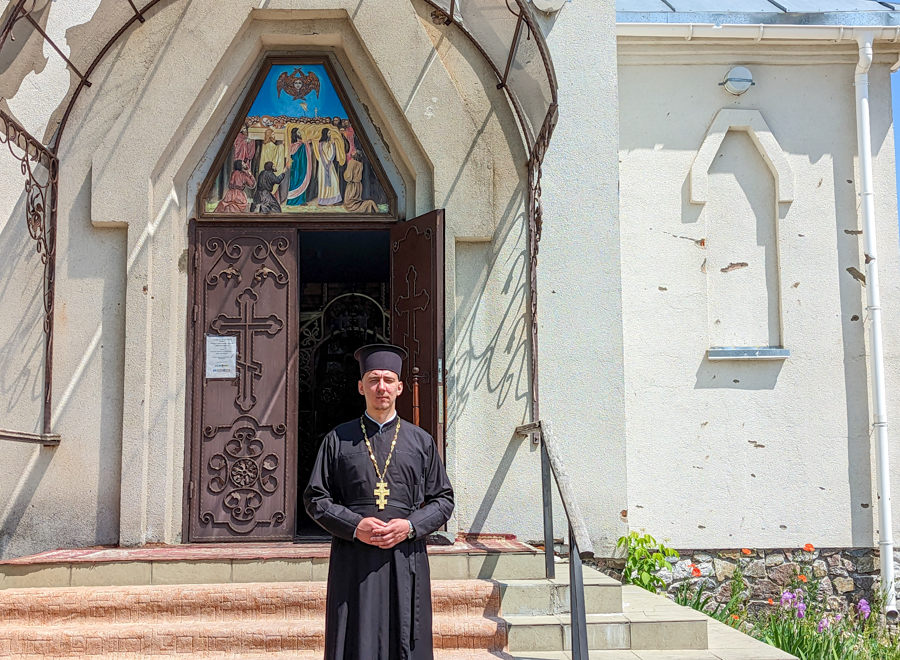It’s Pentecost in Ukraine, and this may be one of the last years most Christians in the country celebrate the holiday separately from the West.
Ukrainian churches and parishioners have taken a hard look at sharing religious celebrations with Russia, after the country launched a full-scale invasion on Ukraine over a year ago.
You may unsubscribe from any of our newsletters at any time.
On May 24, the Orthodox Church of Ukraine (OCU) was the latest and largest church in the country to announce the change to the revised Julian calendar, becoming the 10th Orthodox church in the group known as the “New Calendarists.”
Its decision follows a similar one in February by the Ukrainian Greek Catholic Church, the second-largest Christian denomination in Ukraine, which has been in communion with Rome but followed the old Julian calendar until now.
The similarly named Ukrainian Orthodox Church, which is under the Moscow Patriarchate, still follows the old Julian system, as do four other Orthodox churches.
The change only applies to fixed holidays such as Christmas, which once fell on Jan. 7 in Ukraine and will now fall on Dec. 25. Easter—and all other holidays calculated from it, will continue to be reckoned by the old Julian date, at least for now.
Aside from Russia, Orthodox churches in Serbia, Egypt, Ethiopia and other countries in the East celebrate Christmas on Jan. 7.
“Truly and vitally necessary”
Metropolitan Epiphanius, the head of OCU, said the changes would introduce autonomy in the structure of the church to replace centuries-old subordination.
“Not everyone accepted these decisions, not everyone supported them, but they were true and vitally necessary,” he said, likening the change to using everyday Ukrainian during services instead of Church Slavonic.
In Moshchun, a small village outside of Kyiv that saw fierce fighting in the early days of the war, that vital necessity is on display. The small Church of the Holy Apostle and Evangelist Ivan the Theologian is painted with traditional Orthodox iconography inside and riddled with bullet holes outside, its cemetery littered with broken headstones and craters from Russian missiles.
Father Vasyl, a 28-year-old priest, came to the church in November 2022 when the previous priest became a military chaplain. Almost immediately, the villagers asked him to change the date Christmas was celebrated.
“Demand increased since the attack of the Russian Federation on Ukraine. People just don’t want anything to do with that country,” Vasyl said.
At the time, holding services according to the revised calendar hadn’t been given the official nod by the church, but it was made clear that there’d be no consequences if parishes decided to change their observances. “On Dec. 25, I served the Christmas service for the first time according to the new Julian calendar,” Vasyl said.
Leonid Schirin, a retiree who moved to Moshchun from Kyiv ten years ago, supports the change.
“If we want to be part of the progressive world, we should transition to [the] world’s calendar of holidays,” Schirin said.
War: the catalyst for a long-desired change
Vasyl explained that Ukraine’s desire to adopt a more accurate calendar goes back a century. The short-lived Ukrainian People’s Republic considered switching to the Gregorian calendar in 1918 before the revised Julian calendar was proposed at the Council of Constantinople in 1923.
“Due to the Holodomor, the Second World War and the coming to power of the Bolsheviks, this process slowed down,” he said.
While other catastrophes in Ukraine stopped the change, the war propelled it. “We don’t want to have anything to do with the Russian church, they bless the war, they call it ‘holy,’ killing us and our children,” Vasyl said.
More on Broadview:
- Holodomor: 90 years later, new graphic novel explores Ukrainian genocide
- These two Ontario churches went all out to support a Ukrainian family
- Ukrainian clergy emphasize fighting over forgiveness of sin this Easter
The changes bring more questions surrounding the holidays. In both calendars, Easter is calculated as the first Sunday after the first full moon after the spring equinox, pegged to March 21. Due to the Julian calendar’s drift in dates, Eastern and Western churches differ on when March 21 actually is.
“It’s still necessary to conduct some research and perhaps over the years we will reach a general celebration of Easter,” Vasyl said, adding there are many supporters of this idea.
“We want to return to what was started by our ancestors, to abandon the inaccurate Julian calendar and live in modern Ukraine with a modern church,” Vasyl said. “The church progresses together with people. It must provide for people’s needs.”
***
Matthew Best is a freelance journalist from Toronto currently based out of Ukraine.















